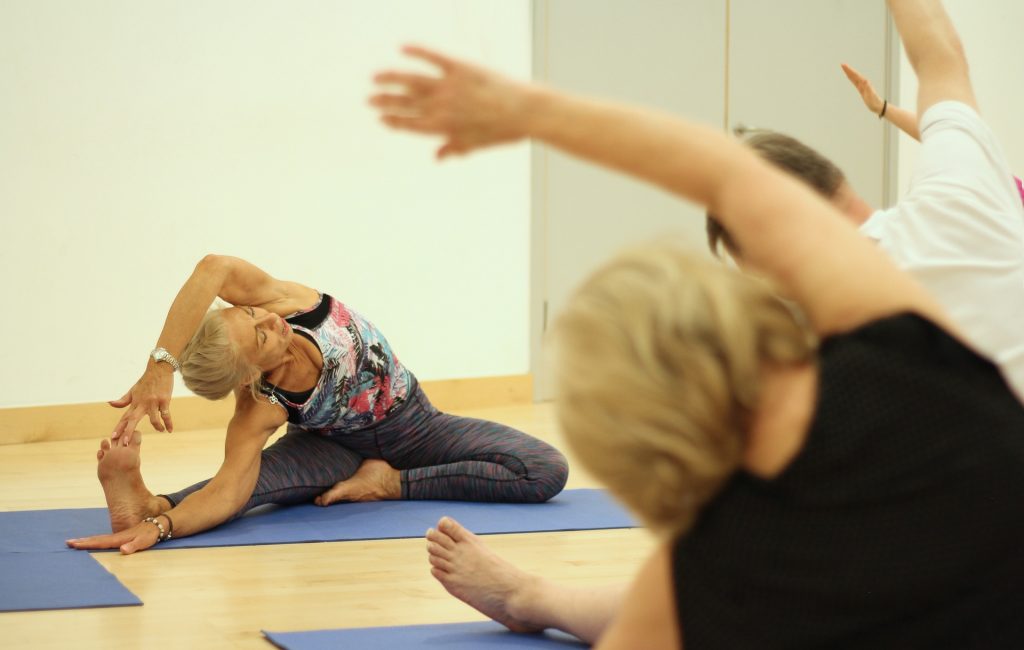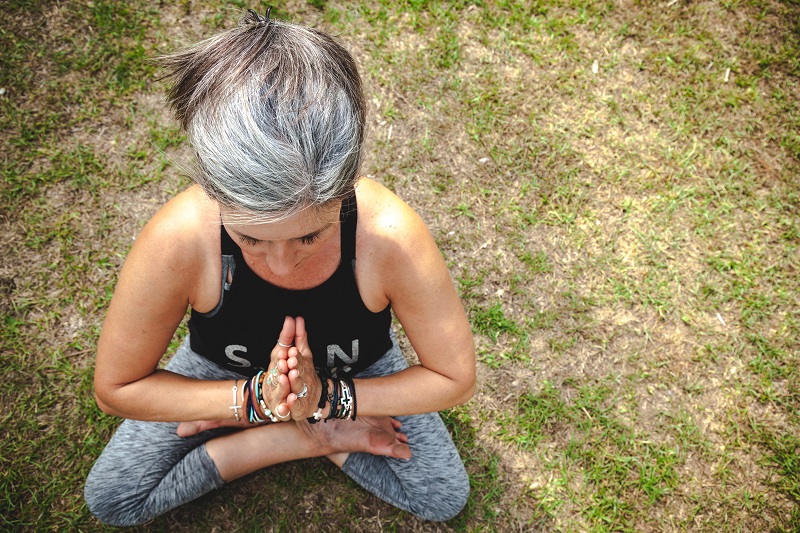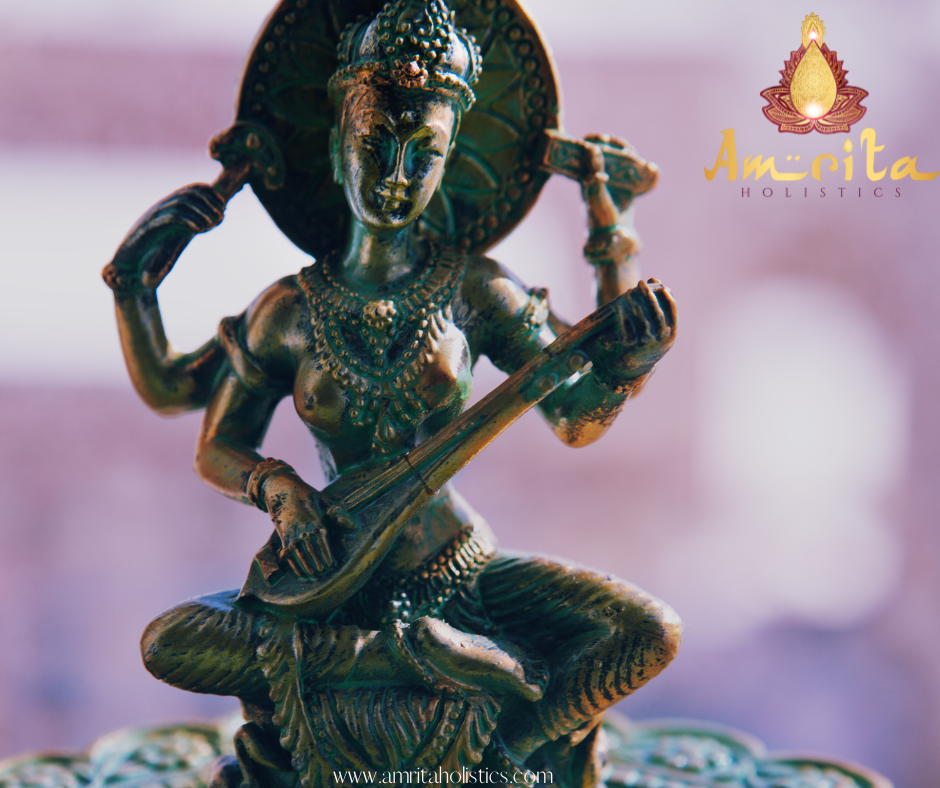Yoga to naturally support the transition & initiation in every woman’s life.
The perimenopause (the phase leading up to menopause) is a period of transition for your body and life stage. It can last up to 10 years before the complete stop of your periods (menopause) and during this time many women experience symptoms such as:
- Irregular or heavy periods
- Hot flushes
- Anxiety & depression
- Brain fog & more
The symptoms will vary from woman to woman, depending on various internal and external factors.
In the western world menopause is something that has previously not been talked about and seen as an inevitable part of the aging process, usually viewed with a sense of dread and seen in quite a negative way. This also no doubt has an impact on how we feel about ourselves during this time and how we deal with and manage the symptoms and changes within ourselves, both on a physical and psychological level.
The ancient Indian science of life – Ayurveda – views menopause not as a disease but as a transition period. An important time in a woman’s life where she has an opportunity to prioritise herself and care for her health and wellbeing in all areas – physically, mentally, emotionally, sexually, and spiritually.
In cultures that recognise and honour the Divine feminine, this phase in life is viewed as an initiation into her deeper inner wisdom, (the “wise woman” archetype) the coming into the fullest blossoming and expression of the feminine that has all of that Goddess energy and power within her. Fully embodied and empowered through her own richness of life experience.
Simply having this different perspective on this transitional phase is transformational in itself. Especially when women come together with the right supportive tools, practices, environment and are encouraged to share their own experiences and support one another through the journey.

How can yoga help us with this transition?
Yoga is primarily a practice of going within, of self-inquiry to find connection with the true self, the “atma” or soul essence. Yogic practice usually begins with the physical body as the foundation for purification, balancing, aligning so that we can come to a place of optimal functioning and wellbeing. When we learn to be still and balanced within the physical body this sets the “seat” or foundation for sitting in meditation and balancing and calming the mind, which in turn helps us to cultivate a deeper understanding of ourselves and spiritual connection.
Yoga also provides us with a set of values and framework for living a more authentic life, one that is in balance and harmony with ourselves, others and the environment around us. This allows for a heightened sense of awareness and in turn enables us to make more conscious, healthy choices.
It is said that once a person becomes aligned and balanced with their head, heart and hand – that is their thoughts, intentions and actions – they are then in a state of yoga (union) – with the individual consciousness and the Universal consciousness. Life flows effortlessly, intuitively and gracefully, and even through more challenging times and events we are better equipped at dealing with them, feeling able to take things more in our stride.
Practicing Yoga Daily
Practicing yoga as a daily, consistent lifestyle choice in all that we do, allows us to tune into our bodies, our energies and connect with the truth of who we are. It is by no means a straight path, but practicing has many positive side effects which can be noticed relatively quickly even for someone just starting out.

Depending on the philosophy, style and techniques practiced, cultivating a regular practice can help to:-
- Boost ones physical strength, bones & muscles
- Increase mental resilience
- Improve overall heart health
- Help improve balance, both physically and energetically
- Helps improve flexibility & mobility
- Increases our awareness of ourselves, and world around us which enables us to make healthier more conscious choices
- Improves relationships
- Deepen our spiritual connection, enabling us to “see the bigger picture” and have a better sense of perspective
- Calms the nervous system and has a balancing effect on our energies
- Raises our energetic vibration – increasing our overall vitality and wellbeing
Some of the other benefits specific to helping women during this life phase are:
- Reduces stress and symptoms of anxiety. It helps to calm the nervous system and therefore can also improve sleep.
- Certain techniques can help to stimulate and balance the thyroid, adrenals and endocrine system. These are responsible for controlling and regulating hormones and have a huge impact on our overall health and balance.
- Some yogic practices may help to serve as useful tools to relieve symptoms such as hot flushes, joint and muscle aches.
- Helps us to feel more balanced emotionally, supporting those with symptoms of anxiety and low mood.
- Some asanas and ayurvedic practices can also help to balance irregular and heavy periods
- It can help to restore depleted energy caused by insomnia and fatigue.
- Yoga can help to reinvigorate a sluggish metabolism, tone and strengthen muscles, build bone density, balance and boost heart health.
- Reinforces positive thoughts and energy vibrations, in turn helping to improve self-esteem.
This list is not exhaustive! The overall positive benefits of yoga are numerous, and it can support you in feeling good about yourself overall. When we are feeling well and balanced, we are in turn more able to make healthy decisions about our lifestyle (nutrition, exercise, work-life balance, priorities, self-care etc) as well as our relationships with others and the environment around us.
Yoga is an integrated, holistic lifestyle approach. It is not a sport, exercise or competition. It requires disciplined, consistent regular practice with ongoing adaptation, tailored to your specific needs, changes and review, as we develop a deeper understanding, closer relationship with and expanded experience of the self.

Investing in ourselves
When we are prepared to invest in ourselves in this way we can support ourselves through these life transitions most effectively and naturally as well as experience incredible transformation in our lives.
Some practices which can be incorporated into a daily routine to support you with this transition and life stage are:
- Incorporating practices that reduce Vata (which typically increases around this time). Rasayana practices – increasing overall “juiciness” or moisture levels in our system – such as application of Ayurveda medicated oils via abhyanga massage, shirodhara. Ensuring we are properly hydrated.
- Pranayama techniques such as Nadi Shodhanam (for balancing) and Sheetali (for cooling).
- Yoga asanas’ such as: forward bends (seated and standing), cat/ cow, camel, sphinx.
- Adjust diet to reduce and balance Pitta and Vata. Reduce caffeine and alcohol and eat warm cooked nourishing foods that are pitta balancing and energetically cooling.
- Maintain a healthy weight, exercise regularly, but not excessively, including gentle weight lifting helps to balance the hormones.
- Drink pomegranate juice and fresh lime or peppermint tea to cool, refresh and cleanse the blood of toxins and excess heat.
- Meditate regularly – it will help to calm the nerves balance and regulate the nervous system, relax balance and restores.

If you are interested to know more about how yoga can support you in this journey please do not hesitate to reach out to me. Contact me to book in for a FREE clarity call.
Main photo by Conscious Design on Unsplash



